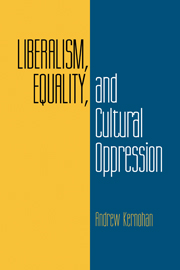Conclusion
Published online by Cambridge University Press: 11 January 2010
Summary
TO be faithful to its vision of the moral equality of persons, egalitarian liberalism must modify its conception of state neutrality. This modification follows from the limitations that the harm principle puts on neutrality; the liberal state should make the most minimal interventions possible in civil society that are sufficient to prevent harms. Once liberalism recognizes the accumulative harm brought about by an inegalitarian cultural environment, it must see the state as having a duty to advocate reform of that cultural environment. In what follows, I shall first sketch what I think should be meant by a harm to someone's cultural identity, and why harms to identity also entail cultural reform. Then I shall briefly discuss some implications of the advocacy strategy by comparing it with Kymlicka's views on the toleration of inegalitarian minority cultures in a multicultural state. I shall conclude by discussing the proper egalitarian liberal response to prevalent attitudes toward the least advantaged.
The notion of “identity” is ambiguous. On the one hand, it can refer to the sets of characteristics by which people are recognized as who they are (e.g., as the child of such and such parents, born at such and such a time). On the other hand, it can refer to the set of characteristics by which an individual is recognized as a member of a group (e.g., someone's racial identity). Within this latter category there are two sorts of group identity. Group membership can be determined on the basis of characteristics over which the group's members have control and for which they can be held responsible.
- Type
- Chapter
- Information
- Liberalism, Equality, and Cultural Oppression , pp. 110 - 117Publisher: Cambridge University PressPrint publication year: 1998



